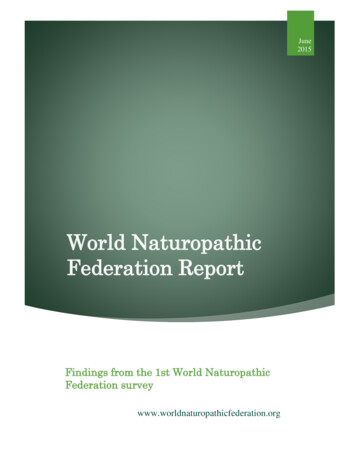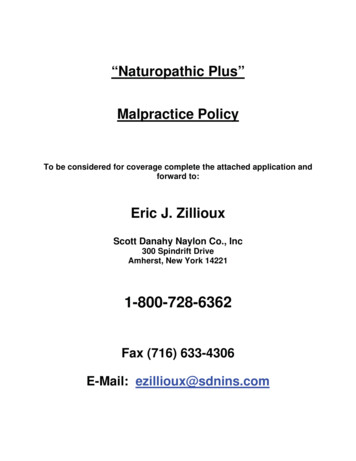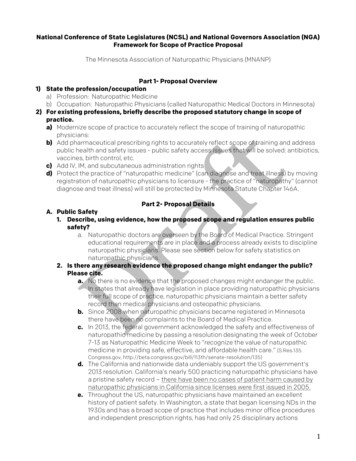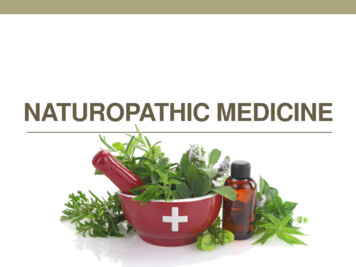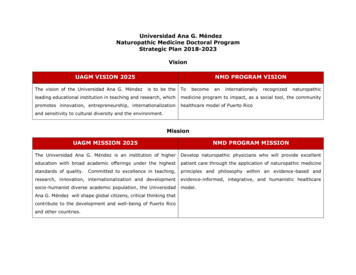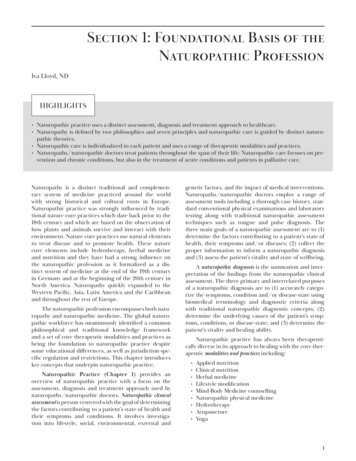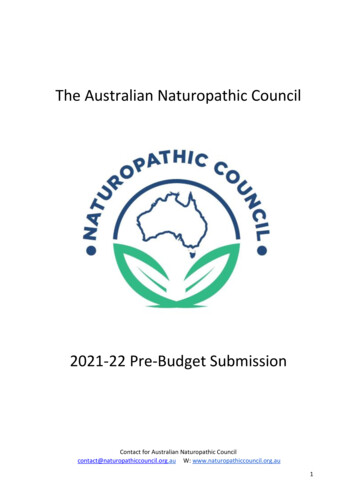
Transcription
The Australian Naturopathic Council2021-22 Pre-Budget SubmissionContact for Australian Naturopathic Councilcontact@naturopathiccouncil.org.au W: www.naturopathiccouncil.org.au1
2021-22 Pre-Budget SubmissionTable of ContentsExecutive Summary3Australian Naturopathic Council (ANC)4Australian Register of Naturopaths and Herbalists (ARONAH)5Naturopaths and Herbalists Association of Australia (NHAA)5Complementary Medicine Association (CMA)5Background: Role of naturopathy in the Australian health system6ANC Pre-Budget Submission Recommendations7Recommendation 1: Reinstate subsidy of private health insurance rebates fornaturopathy7Recommendation 2: Dedicated Federal Government funding for naturopathicresearch10References112
2021-22 Pre-Budget SubmissionExecutive SummaryNaturopathy is a system of health care which is based on traditional philosophies and principles, andutilises a wide variety of tools and techniques to achieve health for a patient. It is estimated thatnaturopathic practitioners consult with approximately 6% of the Australian population, equating tosome 1.5 million Australians, engaging in around four million consultations each year. Naturopaths inAustralia are consulted for a diverse range of health issues, including diagnosed conditions of nationaland global significance. The preventative orientation of naturopaths contributes to alleviating theburden on public health care systems by promoting the health of consumers and preventing themfrom moving into the health care system.RecommendationsRecommendation 1: Reinstate subsidy of private health insurance rebates for naturopathyProblemDespite strong evidence of the positive effect of naturopathic care in supporting chronic conditions,the federal Department of Health ruled that naturopathy be removed from PHI coverage in April2019. This policy change has conferred additional costs to the Australian government and exposedthe public to unnecessary risks by removing one of the few protections in place that allowed thepublic to identify appropriately trained naturopaths.SolutionThe ruling that prohibits rebates for consultations with a naturopath should be changed to permitPHI companies to provide rebates for health practices they deem to be of value to their customers.Furthermore, the government should act on previous recommendations from government reportsexamining the regulatory requirements of the naturopathic profession in Australia and initiate theprocess of including naturopathy in the National Registration and Accreditation Scheme.Recommendation 2: Dedicated Federal Government funding for naturopathic researchProblemResearch examining naturopathic care is critical to effective clinical decision-making, healthcaredelivery, professional development and policy direction. In particular, research is urgently needed toextend the existing evidence-base regarding the clinical effectiveness, economic impact, and servicedelivery of naturopathic care with a focus on health conditions of national priority and commonlyseen among individuals consulting with naturopaths.SolutionThe government should commit 5 million of dedicated funding from the Medical Research FutureFund to examine naturopathic medicine and practice interventions to manage national healthpriority areas and conditions and supports pragmatic, practice-based and comparative effectivenessresearch and other designs that acknowledge and reflect real-world practice and use.3
2021-22 Pre-Budget SubmissionAustralian Naturopathic Council (ANC)The Australian Naturopathic Council (ANC) represents the Australian members of the WorldNaturopathic Federation (WNF), and through lobbying and stakeholder engagement, promotes theprofession of naturopathy. The WNF is part of the World Health Organisation (WHO) and representsover 50 naturopathic organizations from across the world with the aim to promote and advance thenaturopathic profession globally.Naturopathy is a system of health care which is based on traditional philosophies and principles andutilises a wide variety of tools and techniques to achieve health for a patient. There are many toolsand techniques that a naturopath may use to treat a patient, but the four most common ones arenutritional supplements, herbal medicine, dietary advice and lifestyle change.1 These principles canbe found in more detail at the World Naturopathic Federation (WNF) Website.2 Naturopaths inAustralia are required to complete Bachelor level training.The ANC is a coordinating body of organisations representing the naturopathic profession in Australiaand provides a united voice on important issues affecting Australian naturopaths. The ANCmembership is comprised of three professional organisations: Australian Register of Naturopaths and Herbalists (ARONAH)Complementary Medicine Association (CMA)Naturopaths and Herbalists Association of Australia (NHAA)The ANC also includes the two educational institutions that deliver recognised naturopathic trainingin Australia: Endeavour College of Natural Health (ECNH), andSouthern School of Natural Therapies (SSNT)More information about the ANC can be found at https://www.naturopathiccouncil.org.au/. Thissubmission represents a collaborative submission by the professional organisations members of theANC.4
2021-22 Pre-Budget SubmissionAustralian Register of Naturopaths and Herbalists (ARONAH)The Australian Register of Naturopaths and Herbalists (ARONAH) hasbeen established to provide minimum standards of education andpractice for professions of naturopathy and Western herbal medicine. The Board has developed thisindependent register which mirrors government requirements for the regulation of healthpractitioners; specifically, the statutorily regulated Boards administered by the Australian HealthPractitioner Regulation Authority (AHPRA) of the National Registration and Accreditation Schemewhich does not currently oversee Naturopathy and Western herbal medicine professions.Naturopaths and Herbalists Association of Australia (NHAA)The Naturopaths and Herbalists Association of Australia (NHAA) is a peakprofessional association representing appropriately qualified naturopathsand Western herbalists. It is the oldest professional association ofcomplementary therapists in Australia, founded in 1920, and over 80% of the membership of theNHAA are Naturopaths.Complementary Medicine Association (CMA)The Complementary Medicine Association (CMA) is a national not-forprofit peer group practitioner membership association for naturaltherapists and students thereof, encompassing the profession ofNaturopathy and various other modalities of complementary medicine. Founded in 1985, the visionand purpose is to represent health professionals to government bodies, private health insurance (PHI)funds and the general public.5
2021-22 Pre-Budget SubmissionBackground: Role of naturopathy in the Australian health systemNaturopathy is a distinct system of medicine based on holistic and vitalistic principles3,4 whichoriginated in Germany but is now practiced in 98 countries representing all world regions.5Practitioners of naturopathy occupy a prominent position in Australia’s health care sector. It isestimated that they consult with approximately 6% of the Australian population,6 equating to some1.5 million Australians, engaging in around four million consultations each year.7 Sixty percent ofpatients consider their naturopath to be their primary health provider, and 22% consult naturopathsas their sole health care provider.8 The rate of use of naturopathic services appears to have remainedconsistent over the past 25 years6,9 suggesting the persistent and enduring presence of naturopathyin Australia’s health care landscape. Naturopaths are consulted for a diverse range of health issues,including diagnosed conditions of national,10 and global,11 significance, such as type 1 and 2 diabetes,cardiovascular disease, cancer, and respiratory conditions.7,8,12–14 Among the dominant populationsaccessing naturopathic care are patients with digestive conditions, mental health conditions, andpatients consulting for women’s health.1The preventative orientation of naturopaths contributes to alleviating the burden on public healthcare systems by promoting the health of consumers and preventing them from moving into the healthcare system. Core philosophies of naturopathy include the practice of preventive medicine andidentification of the cause of illness in an individual. As well as alleviating acute conditions,naturopaths work with patients to identify underlying and maintaining causes of illness, and toprevent illnesses from occurring, through nutritional and lifestyle measures and encouraging positive,healthy behaviours.15Educating the patient is another core pillar of Naturopathic practice which aims to improve healthliteracy and facilitate self-responsibility. Naturopathic patients report being given a sense of controlover their health, and hope about their future health.16 Patients with chronic conditions report beingtaught goal setting, problem solving and ways to relieve their symptoms by their naturopath,potentially reducing dependency on pharmaceutical medications.17Services charged by naturopaths are out-of-pocket expenses for Australian consumers. Naturopathyis practiced outside of the established funding and regulatory models that define Australia’s publichealth system, including the National Registration and Accreditation Scheme, Medicare, andgovernment-supported private health insurance rebates.6
2021-22 Pre-Budget SubmissionANC Pre-Budget Submission RecommendationsRecommendation 1: Reinstate subsidy of private health insurance rebates fornaturopathy.ProblemDespite strong evidence of the positive effect of naturopathic care in supporting chronicconditions,18 the federal Department of Health ruled that naturopathy be removed from PHIcoverage in April 2019.19 This policy change has conferred additional costs to the Australiangovernment and exposed the public to unnecessary risks by removing one of the few protections inplace that allowed the public to identify appropriately trained naturopaths.In the absence of statutory regulation under Australian Health Practitioner Regulation Authority(AHPRA), naturopathy currently operates in a self-regulated environment. Previous to the PHI rulingregarding natural therapies, PHI companies played a pseudo-regulatory role for the naturopathicprofession, in that their members were only able to claim PHI rebates for consultations withnaturopaths who were members of a professional association and maintained current first aidtraining. As professional association membership is voluntary but requires members to meetminimum education standards and continued professional development requirements, thisexpectation from PHI companies provided an indirect avenue to ensure patients were accessingnaturopaths who were appropriately qualified and accountable. This mechanism also enabledprofessional associations to more effectively enforce standards of public safety.The prohibition for PHI companies to rebate patient consultations with naturopathic practitionerseliminated this pseudo-regulatory function which had been protecting the public interest. In theabsence of title protection through statutory registration, the public is now left exposed tounderqualified and non-compliant persons claiming to practice naturopathy with limitedaccountability and oversight. While there is clinical evidence to support naturopathic care as aneffective option for patients with a range of chronic conditions, patients who consult with individualsclaiming naturopathic qualifications but without recognised training. These patients are at risk of, atbest, missed opportunities to manage these conditions and, at worst, adverse outcomes andcomplications. Either risk results in the patient requiring care from government-funded healthservices and, therefore, an increased financial burden on the health care system.Using the “Review of the Australian Government Rebate on Private Health Insurance for NaturalTherapies”20 as the basis for prohibiting PHI companies from providing rebates for naturopathicconsultations was significantly problematic. Not only was the report limited to published systematicreviews,21 but a more contemporary review of the evidence identified 31 randomised clinical trialscomprising 9798 participants18). The review identified evidence to suggest that whole-systemnaturopathic practice is effective in improving patient health for a range of chronic healthconditions, including anxiety, multiple sclerosis, cardiovascular disease and musculoskeletal7
2021-22 Pre-Budget Submissionconditions. Even without these additional studies, the 2015 Review did identify existing researchreporting clinical benefit from naturopathic care in select conditions, but these were dismissed asnot relevant to the Australian context due to the research being conducted in regulated jurisdictionswhich was contrasted against the unregulated nature of the naturopathic profession in Australia.In response to widespread public and sector feedback that the 2015 Review was not a true reflectionof the current evidence-base for many of the natural therapies examined, naturopathy included, theDepartment of Health commissioned an updated review in 2019. The updated Review is beingconducted in two Tranches with naturopathy included in Tranche 1. The Review is being led by theCommonwealth Chief Medical Officer, with support provided by departmental staff (operational)and an advisory panel of experts (strategic); the latter referred to as the Natural Therapies ReviewExpert Advisory Panel (NTREAP). The scientific review methodology and process is being overseenby the National Health and Medical Research Council but conducted by independent researchgroups.The NTREAP was convened to assess additional available evidence for natural therapies, including afive-year update to its 2014–15 review of natural therapies, undertake public consultation andprovide advice to Government on whether certain natural therapies should be eligible for subsidythrough the private health insurance rebate. This decision will be informed by the outcomes of theReview once it is completed.The Government committed 2 million to support the Review which commenced mid 2019 with thefinal review report intended to be provided to Government in 2020. However, this timeline has beensignificantly extended resulting in substantial additional costs to the Department. The delay is alsocontributing to an exacerbation of some of the problems identified above specifically regardingprofessional oversight.While we welcome the opportunity for an updated Review that includes all relevant originalresearch examining the effectiveness of naturopathic care, rather than being limited only topublished systematic reviews, we argue that the process of coordinating and managing the 2019Review of naturopathy is unnecessarily burdensome for the Department of Health. This isparticularly the case given evidence to support the effectiveness was already identified in the 2015Review.SolutionThe ANC proposes that the ruling that prohibits rebates for consultations with a naturopath bechanged to permit PHI companies to provide rebates for health practices they deem to be of valueto their customers. This change will immediately release the operational and strategic costs relatedto the naturopathy component of the Review incurred by the Department.8
2021-22 Pre-Budget SubmissionThis change will also reinstate the pseudo-regulatory protection access to PHI rebates offered toindividuals accessing naturopathic care in the currently unregulated environment in Australia,thereby minimising any direct and indirect costs associated with individuals accessing underqualifiedor non-compliant persons appropriating the title ‘naturopath’ and placing patients at risk. TheMinister’s ruling to prohibit PHI companies providing rebates for consultations with naturopaths hasmade the absence of regulation an increasingly concerning issue of public safety. For example, sincethe PHI ruling came to effect in April 2019 a non-government accredited college has begun offering acourse titled ‘Advanced Diploma in Naturopathic Practice’ which is not delivered under theAustralian Qualifications Framework (AQF), nor does it meet the educational standards set by thenaturopathic profession.While we acknowledge that access to PHI rebates is not intended to be, nor should be, used as aregulatory mechanism in the absence of statutory registration, it does serve this purpose in thecurrent landscape. With this in mind, we also propose that the government act on previousrecommendations from government reports examining the regulatory requirements of thenaturopathic profession in Australia22 and initiate the process of including naturopathy in the NRAS.Registration focuses on providing several safeguards to ensure the public are accessing safe andeffective health care from appropriately qualified health practitioners. Every evaluation under thesecriteria has recommended that naturopaths warrant registration.23 Naturopathic practitioners haveconsistently identified regulation of the profession as the major challenge the profession faces andsupport the implementation of regulation to ensure practice standards and promote public safety.24Our concerns are that untrained and unethical practitioners are also able to practice using the titleof ‘naturopath’ – the professional naturopathic community in Australia and globally does notconsider these practitioners as part of the profession. For the last 20 years the industry standard ofnaturopathic education has been a 4-year Bachelor degree in Australia. Since 2015, governmentlegislation and accreditation have mandated requirements that naturopathic education must bedelivered within a degree model.By including the naturopathic profession in the NRAS, the cost and burden of regulating theprofession would be covered by the profession itself rather than defrayed to other departments andorganisations not intended to provide regulatory oversight, such as PHI rebate budget items.9
2021-22 Pre-Budget SubmissionRecommendation 2: Dedicated Federal Government funding for naturopathicresearchProblemThe ANC applauds health initiatives such as the National Preventive Health Strategy, whichrecognises the need for a more holistic approach to a system wide, evidence-based approach inreducing poor health. The ANC also supports the goal of the Medical Research Future Fund (MRFF)and their recognition of the vital function of ongoing research as an integral part of improved healthcare delivery and sustainability.Naturopathy users are likely to have a diagnosed chronic illness - often with conditions falling intothe category of national health priorities.7,8,12–14 Additionally, naturopaths commonly treat otherhealth issues of national significance. These include digestive disorders, key areas of mental health(anxiety and depression), and women’s health conditions.1 They also treat diverse populationsacross all life stages and inclusive of populations known to have unmet healthcare needs (ref). Forexample, women are high users of naturopathy and often consult naturopaths for menstrualdisorders such as endometriosis1 - an area identified by patients, clinicians and decision-makers asinsufficiently managed by conventional medicine and in need of a multi-disciplinary approach.25Despite the significant level of naturopathic consultations in Australia7,8 there has been no dedicatedfunding allocated to clinical research into naturopathic care from the MRFF or any other federalgovernment research funding scheme.Research examining naturopathic care is critical to effective clinical decision-making, healthcaredelivery, professional development and policy direction.26 In particular, research is urgently neededto extend the existing evidence-base regarding the clinical effectiveness, economic impact, andservice delivery of naturopathic care with a focus on health conditions of national priority andcommonly seen among individuals consulting with naturopaths.7SolutionIt is in the public interest for the gaps in current research evidence associated with naturopathic careto be addressed. This requires Government funding for clinical trials examining whole-system, multimodality naturopathic medicine. To date, the Australian naturopathic profession has been active inresearch, with naturopathic researchers attracting competitive funding through NHMRC grants. In2013, research showed significant growth in the number of naturopaths receiving NHMRC grants,compared to other practitioners of complementary and alternative medicine (CAM) such aschiropractors and osteopaths,26 portrayed in Figure 1. Further, Australian naturopaths haveattracted more federal government funding than nurses, pharmacists, physiotherapists,psychologists, chiropractors, and osteopaths.26 This trend has occurred despite naturopathic courseslargely existing outside of publicly-funded universities, meaning the naturopathic researchers10
2021-22 Pre-Budget Submissionundertaking this work are usually employed as health, medicine or public health researchers inmainstream university faculty environments.Figure 1: Cumulative NHMRC grants secured by CAM professional faculties within the university sector.TCM traditional Chinese medicine. *Naturopathy no longer has a university-based faculty, 2007-20178Evidently, the naturopathic profession has capacity to design and conduct high-level clinicalresearch. A significant amount of foundational research has been conducted by naturopathicresearchers, despite a lack of dedicated research funding. However, federal government funding isrequired to explicitly support naturopathic research focused on the health conditions commonlyexperienced by Australian populations who consult with naturopaths, with preference given toconditions that align with Australian strategic and research priority areas - such as those withchronic illness, mental health conditions.7Taking into consideration the evidence of population and consultation characteristics of Australiannaturopathic practice, the ANC proposes the government commit 5 million of dedicated fundingfrom the Medical Research Future Fund to examine naturopathic medicine and practiceinterventions to manage national health priority areas and conditions including digestive disorders,mental health, and women’s health conditions. In light of the identified issues regarding theapplicability of randomised-controlled trial designs within the context of complex interventions suchas naturopathy,26–28 this research funding should explicitly include support for diverse clinicalresearch methodologies that answer clinical questions - such as pragmatic, practice-based andcomparative effectiveness research and other designs that acknowledge and reflect real-worldpractice and use.11
2021-22 Pre-Budget 14.15.16.17.Steel A, Schloss J, Leach M, Adams J. The naturopathic profession in Australia: A secondaryanalysis of the Practitioner Research and Collaboration Initiative (PRACI). Complement TherClin Pract. 2020 Aug;40:101220.WNF About Naturopathy [Internet]. World Naturopathic Federation. Available naturopathy/Baars EW, Hamre HJ. Whole Medical Systems versus the System of Conventional Biomedicine:A Critical, Narrative Review of Similarities, Differences, and Factors That Promote theIntegration Process. Evid Based Complement Alternat Med. 2017;2017:1–13.Fleming SA, Gutknecht NC. Naturopathy and the Primary Care Practice. Prim Care Clin OffPract. 2010 Mar;37(1):119–36.Steel A, Foley H, Bradley R, Van De Venter C, Lloyd I, Schloss J, et al. Overview of internationalnaturopathic practice and patient characteristics: results from a cross-sectional study in 14countries. BMC Complement Med Ther. 2020 Dec;20(1):59.Steel A, McIntyre E, Harnett J, Foley H, Adams J, Sibbritt D, et al. Complementary medicine usein the Australian population: Results of a nationally-representative cross-sectional survey. SciRep. 2018 Dec;8(1):17325.McIntyre E, Adams J, Foley H, Harnett J, Leach MJ, Reid R, et al. Consultations withNaturopaths and Western Herbalists: Prevalence of Use and Characteristics of Users inAustralia. J Altern Complement Med N Y N. 2019 Feb;25(2):181–8.Wardle J, Steel A, Casteleijn D. An evidence based overview of naturopathic practice inAustralia. Bowman D, editor. Aust J Herb Naturop Med. 2019 Mar 15;31(1):9–13.MacLennan AH, Myers SP, Taylor AW. The continuing use of complementary and alternativemedicine in South Australia: costs and beliefs in 2004. Med J Aust. 2006 Jan 2;184(1):27–31.Australian Burden of Disease Study: impact and causes of illness and death in Australia 2015[Internet]. Australian Institute of Health and Welfare; 2019. Available from: Australian Institute of Health and WelfareGlobal status report on noncommunicable diseases 2010 [Internet]. World HealthOrganization; 2011. Available from:https://www.who.int/nmh/publications/ncd report full en.pdfAdams J, Sibbritt D, Young AF. Naturopathy/herbalism consultations by mid-aged Australianwomen who have cancer. Eur J Cancer Care (Engl). 2005 Dec;14(5):443–7.Ng HS, Koczwara B, Roder D, Chan RJ, Vitry A. Patterns of health service utilisation among theAustralian population with cancer compared with the general population. Aust Health Rev.2020;44(3):470.Tan AC, Mak JCS. Complementary and alternative medicine in diabetes (CALMIND) – aprospective study. J Complement Integr Med [Internet]. 2015 Jan 1 [cited 2021 Jan 19];12(1).Available from: 38Steel A, Tiveron S, Reid R, Wardle J, Cramer H, Adams J, et al. Do women who consult withnaturopaths or herbalists have a healthy lifestyle?: a secondary analysis of the Australianlongitudinal study on women’s health. BMC Complement Med Ther. 2020 Dec;20(1):349.Foley H, Steel A, Adams J. Consultation with complementary medicine practitioners byindividuals with chronic conditions: Characteristics and reasons for consultation in Australianclinical settings. Health Soc Care Community. 2020 Jun 19;hsc.13072.Foley H, Steel A, Adams J. Perceptions of person-centred care amongst individuals with chronic12
2021-22 Pre-Budget ons who consult complementary medicine practitioners. Complement Ther Med. 2020Aug;52:102518.Myers SP, Vigar V. The State of the Evidence for Whole-System, Multi-Modality NaturopathicMedicine: A Systematic Scoping Review. J Altern Complement Med N Y N. 2019 Feb;25(2):141–68.Hunt G. Major reforms to make private health insurance simpler and more affordable[Internet]. 2017. Available from: nsurance-simpler-and-more-affordableBaggoley C. Review of the Australian Government Rebate on Natural Therapies for PrivateHealth Insurance [Internet]. Australian Government Department of Health; 2015. Availablefrom: 37510727157632Wardle J. The Australian government review of natural therapies for private health insurancerebates: What does it say and what does it mean? Adv Integr Med. 2016 Apr;3(1):3–10.Vivian Lin, Alan Bensoussan, Stephen P. Myers, Pauline McCabe, Marc Cohen, Sophie Hill, et al.The Practice and Regulatory Requirements of Naturopathy and Western Herbal Medicine[Internet]. Victoria: School of Public Health, La Trobe University; 2005. Available ropathy-final1106.pdfReport from the Osteopathy Chiropractic and Naturopathy Committee [Internet]. VictoriaGovernment; 1975. Available ub/VPARL1974-76NoD27.pdfWardle J, Adams J, Lui C, Steel A. Current challenges and future directions for naturopathicmedicine in Australia: a qualitative examination of perceptions and experiences fromgrassroots practice. BMC Complement Altern Med. 2013 Jan 14;13:15.National action plan for endometriosis [Internet]. 2018. Available ons/what-were-doing-aboutendometriosis?utm source health.gov.au&utm medium callout-autocustom&utm campaign digital isWardle J, Adams J. Are the CAM professions engaging in high-level health and medicalresearch? Trends in publicly funded complementary medicine research grants in Australia.Complement Ther Med. 2013 Dec;21(6):746–9.Schloss J, McIntyre E, Steel A, Bradley R, Harnett J, Reid R, et al. Lessons from Outside andWithin: Exploring Advancements in Methodology for Naturopathic Medicine Clinical Research.J Altern Complement Med. 2019 Feb;25(2):135–40.Wardle, J, Seely, D. Traditional, complementary and integrative medicine: an internationalreader. In: Traditional, complementary and integrative medicine: an international reader.London: Palgrave Macmillan; 2012. p. 266–74.13
6 2021-22 Pre-Budget Submission Background: Role of naturopathy in the Australian health system Naturopathy is a distinct system of medicine based on holistic and vitalistic principles3,4 which originated in Germany but is now practiced in 98 countries representing all world regions.5 Practitioners of naturopathy occupy a prominent position in Australia's health care sector.


